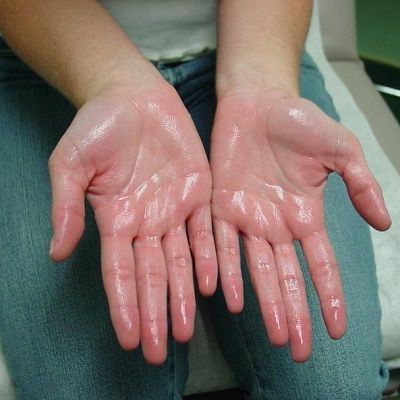Dermatology Tips and Treatments for Hyperhydrosis of Hands: Cutting-edge Solutions
Recognizing the Origin of Excessive Sweating and Its Impact on Every Day Life
While it is frequently understood as a physiological action to regulate body temperature, the triggers for extreme sweating can differ extensively amongst people, including not only physical elements but emotional and also emotional elements. By delving right into the root creates of hyperhidrosis and exploring its multifaceted effects, a much deeper understanding of this prevalent problem can be gotten, shedding light on the complexities that individuals grappling with excessive sweating browse on a daily basis.
Physiology of Sweat Glands
The law of sweat manufacturing, a critical physical process, is mainly managed by the activity of sweat glands dispersed throughout the human body. Sweat glands are classified right into 2 main types: eccrine and apocrine glands.
When the body temperature level increases, either because of physical activity, heats, or psychological stress, the nerves causes the gland to generate sweat. This sweat is composed mostly of water and electrolytes like salt and chloride. The process of sweat manufacturing is vital for keeping the body's interior temperature level within a slim, optimal array, highlighting the crucial function gland play in human physiology.
Triggers for Excessive Sweating
In comprehending the origin causes of extreme sweating, it is crucial to determine the triggers that can cause this physical action. Too much sweating, likewise referred to as hyperhidrosis, can be motivated by various elements, both physical and environmental. One common trigger is emotional tension or stress and anxiety, which can stimulate the body's sweat glands to produce more sweat than is needed for cooling down. Physical effort, heats, and spicy foods are also understood to cause extreme sweating in individuals susceptible to this condition. Specific medical conditions like hyperthyroidism, menopause, or diabetes can contribute to excessive sweating as well.
In addition, medications such as some antidepressants, opioids, and specific supplements can likewise serve as triggers for hyperhidrosis. Comprehending these triggers is necessary in taking care of too much sweating effectively - Exessive Sweating. By recognizing and dealing with the details triggers that prompt extreme sweating in a specific, healthcare carriers can create customized therapy strategies to reduce this condition and boost the individual's lifestyle
Medical Issue Associated
Linked with too much sweating are various medical problems that can intensify this physiological feedback. One common problem is hyperhidrosis, a disorder identified by abnormally boosted sweating that surpasses the body's thermoregulatory demands. This can show up in focal areas like the palms, soles, underarms, or face, influencing an individual's lifestyle due to social humiliation and discomfort.
In addition, endocrine conditions such as hyperthyroidism, diabetes mellitus, and menopausal warm flashes can also lead to excessive sweating. Hyperthyroidism triggers an overflow of thyroid hormonal agents, accelerating metabolic rate and activating sweating.
Moreover, infections like hiv, endocarditis, and tuberculosis have been linked with evening sweats, a typical sign understood to disrupt sleep and affect general wellness. These medical conditions highlight the varied variety of underlying variables that can add to excessive sweating, requiring complete assessment and monitoring by health care specialists.
Emotional and Emotional Variables

Influence On Social Interactions
Too much sweating can have extensive impacts on an individual's capability to engage comfortably in social interactions. The visible indicators of sweat discolorations or wet spots on clothes can lead to shame and self-consciousness, creating people to withdraw from social circumstances. This withdrawal can impact connections, limit social tasks, and impede specialist and individual growth.

Moreover, the stress and anxiety and self-confidence issues originating from excessive sweating can impact interaction and social skills. People may struggle to concentrate on conversations, take part in team tasks, or express themselves confidently. This can bring about feelings of seclusion and solitude, as social links end up being testing to maintain.
Conclusion

While it is commonly recognized as a physiological reaction to control body temperature level, the triggers for excessive sweating can differ extensively among people, including not only physical elements but likewise emotional and mental aspects. By delving into the origin causes of hyperhidrosis and discovering its complex results, a deeper understanding of this prevalent problem can be acquired, losing light on the intricacies that people grappling with excessive sweating browse on a day-to-day basis.
Physical exertion, high temperatures, and spicy foods are likewise understood to set off extreme sweating in people susceptible to this problem. By identifying and resolving the particular triggers that motivate excessive sweating in an individual, medical care service providers can develop individualized therapy strategies to reduce this condition and boost the person's quality of life.
Extreme sweating can have profound effects on an individual's capacity to involve comfortably in social communications.